An Opera About Malcolm X Breaks Boundaries
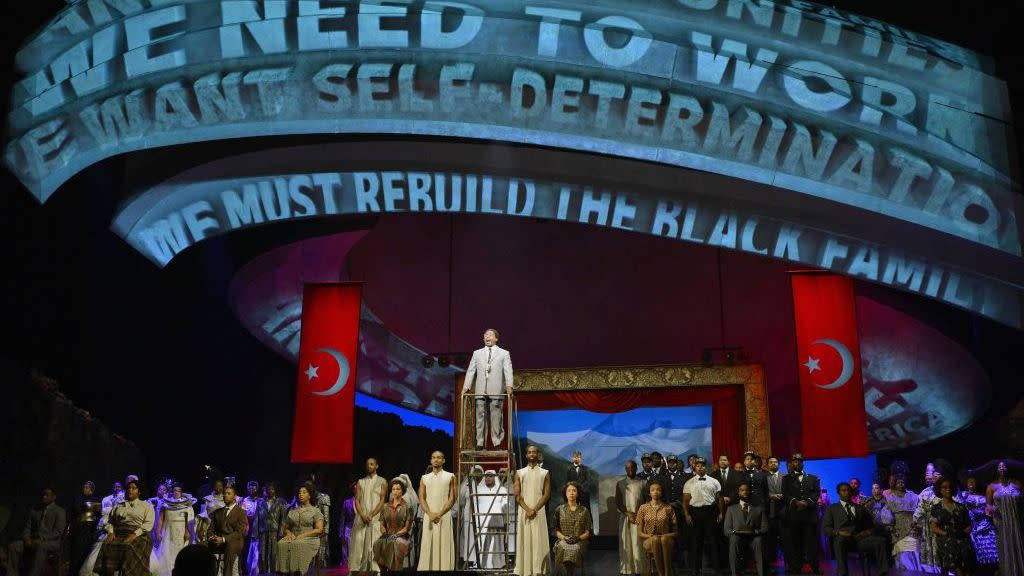
- Oops!Something went wrong.Please try again later.
- Oops!Something went wrong.Please try again later.
A man is standing on the vast stage of New York City’s Metropolitan Opera House in Lincoln Center. For a brief moment, he’s alone—singing in strident tones about the future of Black people, not just in America but across the rest of the world as well, a new world to come. But even as he sings with messianic fervor, the voices break around him: members of the chorus who represent white reporters, while others carry the stark, recognizable signs of the Civil Rights Movement, breaking in to support him. And still another woman and and man, his wife and his advisor, breaking in to warn him. The man sings, “I have learned so much in Africa / We are a part of something so big / A movement spanning the globe / We are freedom fighters, all!” and from the wings of the Met theater stage, joining the skeptical chorus of white reporters and the harmonizing of supporters, is a mass of people dressed in fantastical clothing that references the 19th century and the Afrofuturist fantasies of the 20th, streaked with white and black and gray and gold.
The man at the center of this remarkable piece of stagecraft is Malcolm X, as sung by the powerful baritone Will Liverman, and this is a scene in the middle of the Met’s new production X: The Life and Times of Malcolm X. First staged in 1986, the opera is the work of composer Anthony Davis and poet and critic Thulani Davis. Since its premiere, the opera’s subject, Malcolm X, has shape-shifted through the nation’s imagination, from ideological outlaw to Civil Rights leader hazily remembered and welcomed into the political establishment. As Manning Marable reported in his groundbreaking Pulitzer Prize–winning biography Malcolm X: A Life of Reinvention, in the 1990s even Republican vice president and original culture warrior Dan Quayle felt comfortable claiming The Autobiography of Malcolm X was one of his favorite books. Malcolm X is part of the story America tells itself about itself, but he fits in only if one doesn’t pay too much attention to his actual words. When Thulani Davis began writing the libretto to the opera in the early ’80s, “the recordings of his speeches were (only) on vinyl,” she tells me. “They weren't all that easy to find. There were bootleg versions. And there were rappers starting to use his stuff. I was reading in the paper about [Malcolm’s widow] Betty Shabazz taking them to court.”
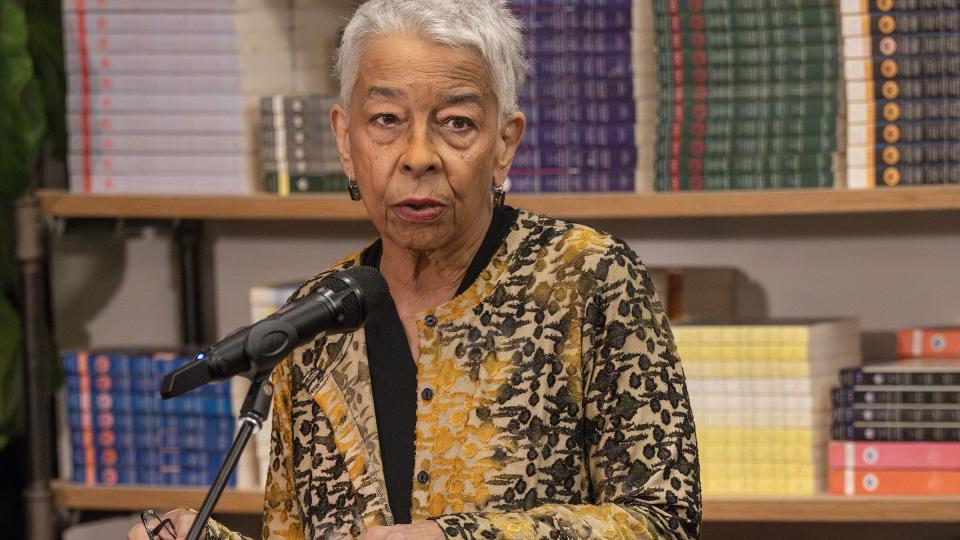
When I interview Davis, it is three weeks before the opening of the Met’s production. We are sitting in a room with red velvet walls, in the Lincoln Center press office for the opera. X is a huge departure for the Metropolitan Opera as an organization. Until 2021—that is, for the first 138 years of its existence—the Met had never staged an opera by a Black composer. Caught up in the so-called “racial reckoning” of 2020, in the wake of George Floyd’s murder and the accompanying unrest, the Met, like many cultural institutions, committed to including Black artists and voices in their productions. The first result of this commitment was the adaptation of Charles Blow’s 2014 memoir, Fire Shut Up in My Bones, which premiered in 2021. X is the next such endeavor, though it has been performed at opera companies around the country since its premiere in the mid-’80s.
Working on the libretto without access to many of his speeches, and before texts were readily available on the internet, meant that “[m]ost of it needed to be me,” Davis explains. “There are some places where I quote [Malcom], but it was too hard to [re]construct. I have to inhabit all the characters somehow and give them [a] personal voice. I didn't know if I could keep it lifted to a place of, not just clarity, but having some beauty to it.”
She goes on: “I didn't quite understand the theatrical impact of the liberties I took till I saw it [again] last spring.” The child version of Malcolm comes out and sings an aria after his father has died under mysterious, violent circumstances and his mother has descended into madness and been institutionalized. Both parents, of course, have spent the previous years as acolytes of Marcus Garvey, organizing for Black liberation in Michigan.
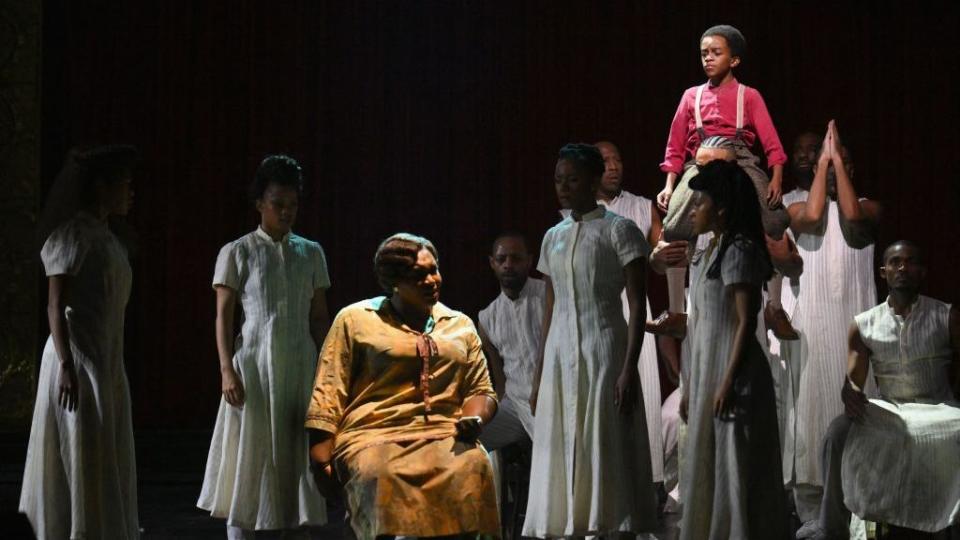
“I had a deep emotional reaction to hearing it that I hadn't had 36 years ago,” Davis says. “I cried all the way through it and for some time afterwards. I remembered losing my mother when I was six. I had sat through all those rehearsals all those years ago, and you couldn't punch that armor I had on, then. But the experience of [losing] a parent, for me, taps into all the unspoken trauma that we all have in this country as African-Americans. It affects the audience, that it’s a child singing these very simple words: Mama helped me. There's a place in all of us that responds to that. I said to myself, This is what an opera can do—which is allow you to feel something you've been through, that you're not trying to feel during your busy days when you have to do this and then do that.”
Thulani Davis is an influential figure in the history of Black literature in her own right—a poet who collaborated with Ntzoake Shange, introduced critic Greg Tate to The Village Voice, and was one of the few Black women to cover the 1984 presidential campaign. When she began writing the opera and when it was first performed at the Kitchen, many people who’d known Malcolm and organized with him were still alive. For the 1986 production, Davis says, “There was one aria I wrote, for [the character of] Betty. When we got close to starting a rehearsal at City Opera, I had met with [the actual Betty Shabazz] by then, and then somewhere in the process, I heard from at least one of the daughters. That aria is really rough [emotionally]. I wasn’t sure if I wanted the whole Shabazz family to sit through that. The aria was about the fact that [Betty could tell the henchman would be coming for him. I feel as though someone living in the same house with him who had been through a fire bombing … would have the thought that somebody might kill him. It just seemed like human nature that, at some point as a wife and mother, you have an idea of what the worst would be or could be. So I wrote it like that.” Davis ultimately removed the aria for that production and came up with another to replace it, but for this run, nearly 60 years after the assassination in question, it returns. “It’s a much better aria than the other one I wrote [to replace it],” she says. It’s another instance of the passage of time shifting how stories of resistance and political violence are received.
On the day I sit in on rehearsals, the words Malcolm and Betty and the protesters sing onstage take on a new sharpness, in light of the last few years’ discussions around racial reckonings and inclusion in America. “Ballots or bullets / Ballots or bullets / The settlers came and took the ground from Black, yellow folks, and brown,” the chorus sings, and the words take on a political urgency usually glossed over in opera.
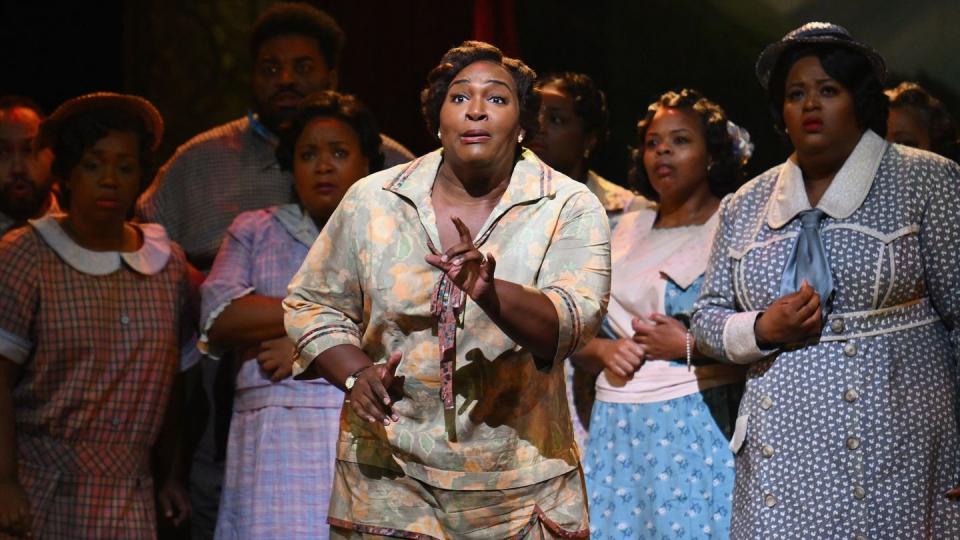
“Detroit Opera—their [2021] production of X was their first sold-out show in 10 years,” Leah Hawkins tells me.. “That alone told you the impact that this had.” Hawkins, who sings the roles of Betty Shabazz and Malcolm’s mother, Louise Little, didn’t perform in the Detroit production, but she attended performances in preparation for this role. “The audience was incredibly Black. [Ushers] were letting people go in and out, because many of them had never experienced sitting in a theater hearing this kind of music for long periods. They weren't leaving—they just needed a break and then to come back. At first I was like, Why are they going in and out? I’m looking around. But if you want people to come back, you don't have an usher telling them, ‘Oh no, you, you can’t do that.’ But also, it's the nature of the music. It's 20th-century opera music. It can be hard to listen to. You might need a breather to sit through it. The material is heavy. [Malcolm’s] life was not, you know, flowers and rainbows and butterflies."
“But the thing is,” she continues, “I kept noticing that people who got up were coming right back and they were responding less to the music, I think, and more to the message, which was striking. Because often in opera, especially our longtime operagoers, they're always worried about beauty of tone—if it was ‘just like the recording I heard in 1958 [when] this famous singer did it this way.’ This was not about that. It was about hearing that message on a stage and being portrayed by very fully fleshed-out characterizations.”
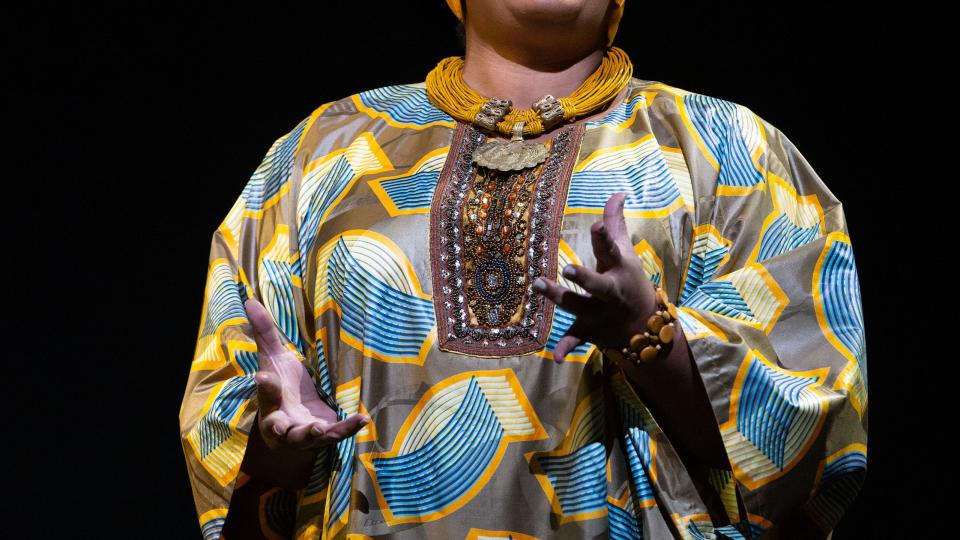
Raehann Bryce-Davis, who sings the parts of Malcolm’s sister and mentor Ella, and the Queen Mother, says, “Everybody will react differently, because everybody comes from a completely different place. Some people are coming because they're open and they want to know more about a historical figure and they want to have this really new experience. Some are coming because they're Met subscribers and they always come—like, Oh God, one of these. I don't think there's gonna be one global reaction and, honestly, that's one of the great things about art, is that it hits everyone differently.”
X has the challenge of presenting a truly revolutionary life to a larger culture that now uses the descriptor disruptor to identify someone who excels at marketing, rather than anyone who actually threatens the status quo. How do you capture the truly revelatory spirit of a figure like Malcolm X, a man, as Bryce-Davis reminds me, his sister described as her “Jesus”? In addition to Davis’s score and the soaring music, it’s the costuming by Dede Ayite, that imagines an Afrofuturist chorus alongside the zoot suits and overcoats of Malcolm X’s epic life.
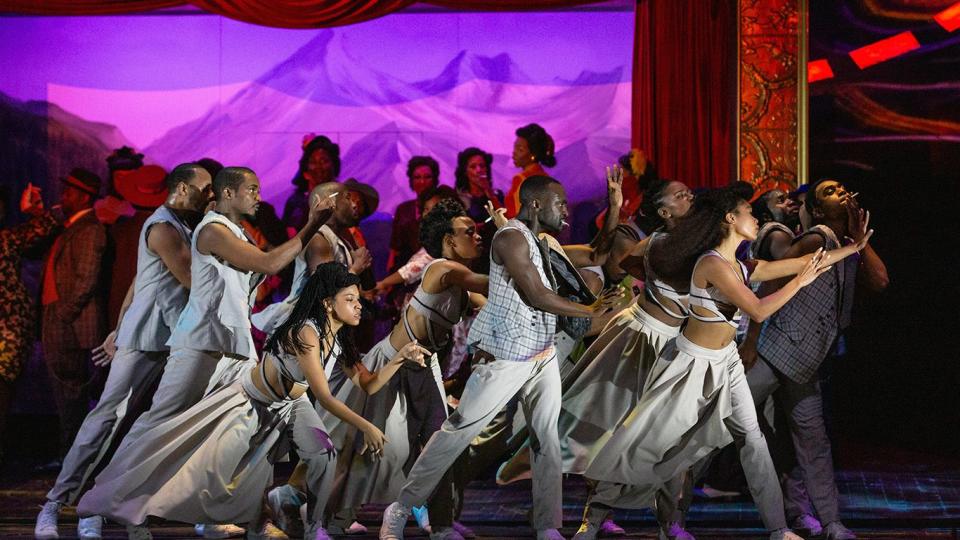
Ayite, who also created the vibrant costumes of this Broadway season’s Jaja’s African Hair Braiding, says, “Malcolm's words and his life and his story and the things that he stood by still hold true today, and have held true for so many years, and are still part of the conversation and struggle that Black and brown bodies are going through each day. It felt important to honor the journey of getting where we are here today—so, honoring his life story and holding space for the period elements of his journey through the ’20s, ’40s, ’50s, ’60s, and just ordering his life. But at the same time, the beautiful thing and the impactful thing about Malcolm is that the words just, like, still live on, right?” she says. “That's where the Afrofuturism came in, and that wanting to just hold space for Blackness and all its capacities in the past, present, and future, and acknowledging, just as Black people, how storytelling lifts us and holds us close.”
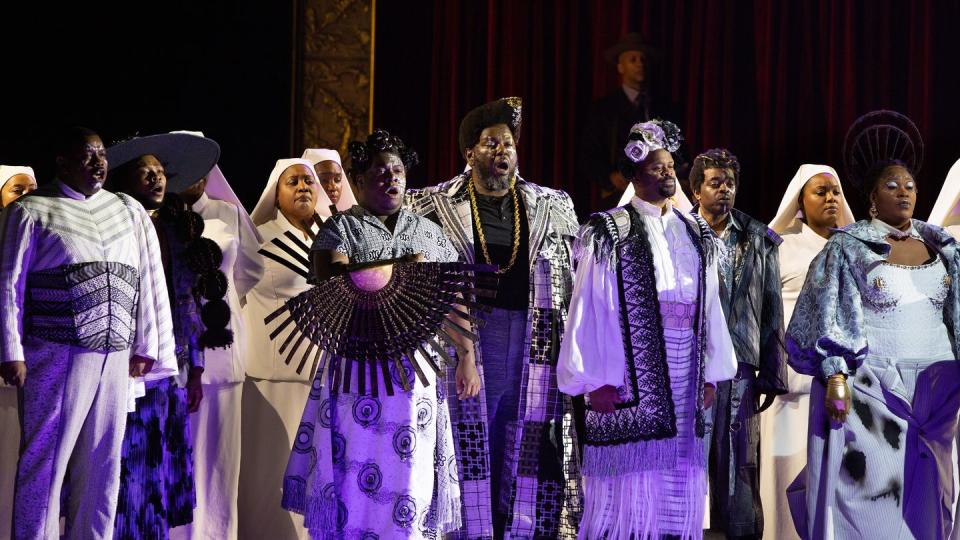
And so, on the stage of the Met Opera, Malcolm X sings of the future and the past and the need to keep fighting, and the Black writers, artists, and performers who came after him and work to keep him alive.
You Might Also Like

